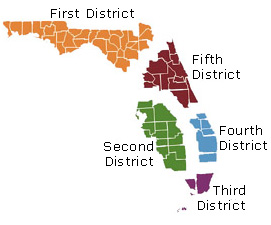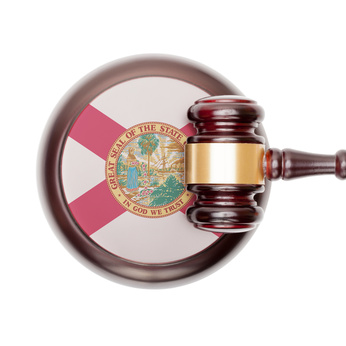The U.S. Bankruptcy Court for the Middle District of Florida recently overruled a debtor’s objection to a mortgagee’s secured claim and denied the debtor’s motion to determine secured status, holding that the issues should have been brought by adversary proceeding, and in any event neither Florida’s statute of limitations nor its statute of repose barred enforcement of the note and mortgage. A copy of the opinion in In re Anthony is available at: Link to Opinion. A mortgagee filed a mortgage foreclosure action in Florida state court in 2009. The complaint contained a paragraph accelerating the note. The mortgagee also…
Posts published in “Foreclosure”
The District Court of Appeal of Florida, Second District, recently dismissed the appeal of a foreclosure judgment by a third party purchaser of the collateral property, where the third party purchased the collateral property while it was the subject of a foreclosure proceeding and a recorded lis pendens. In so ruling, the Appellate Court confirmed a third party purchaser had no standing to appeal a final judgment of foreclosure where the purchaser did not appeal a prior denial of its motion to intervene, even though the third party purchaser’s name was erroneously placed in the style of the uniform final…
The District Court of Appeal of the State of Florida, Fifth District, recently held that the trial court erred by denying the borrower’s motion to involuntarily dismiss a foreclosure action, because the plaintiff mortgagee’s counsel failed to properly introduce evidence to reestablish the lost note, prove that it had standing to foreclose, prove the amount owed, and demonstrate compliance with the mortgage’s condition precedent of giving notice of default. A copy of the opinion in Figueroa v. Federal National Mortgage Association, etc., et al is available at: Link to Opinion. A servicer foreclosed alleging that the borrower defaulted under the note by failing…
The District Court of Appeal of Florida, Second District, recently affirmed the trial court’s denial of a third party record title holder’s motion to cancel a mortgage foreclosure sale, even though the third party movant acquired title in a prior homeowners association lien foreclosure action, and even though the third party movant alleged that the mortgagee thwarted its redemption rights by supposedly failing to provide an estoppel letter. A copy of the opinion in Whitburn, LLC v. Wells Fargo Bank, N.A. is available at: Link to Opinion. In December 2012, a mortgagee filed a foreclosure action along with a lis pendens against…
In a case addressing what it means to “surrender” property under the Bankruptcy Code, the U.S. District Court for the Southern District of Florida recently held that a Chapter 7 trustee’s abandonment of real property only restores legal title to the debtors as if no bankruptcy petition had been filed, and does not also give the debtors the right to contest the mortgagee’s foreclosure if the debtors elected to surrender the property. A copy of the opinion in Failla v. Citibank, NA is available at: Link to Opinion. Husband and wife debtors defaulted on their mortgage and the mortgagee sued to foreclose.…
The District Court of Appeals of the State of Florida, Fourth District, recently reversed final judgment of foreclosure in favor of a mortgagee for entry of judgment in favor of the mortgagors, where the mortgagee failed to prove that it came into possession of the note containing an undated, blank endorsement before the foreclosure was filed. In so ruling, the Fourth District confirmed that a trial court abuses its discretion in admitting business records if it is not established that the records were made at or near the time of the event. In addition, the Fourth District held that a…
The Appellate Division of the Fifteenth Judicial Circuit of the State of Florida recently reversed dismissal of a federal Fair Debt Collection Practices Act (FDCPA) claim alleging a debt collector’s letter falsely represented a bank was the creditor of a loan. In so ruling, the Appellate Division confirmed that even though a foreclosure action is not necessarily debt collection, the enforcement of a promissory note constitutes debt collection activity even if done in conjunction with the enforcement of a security interest, and even the debt collector stated it was seeking solely to foreclose the creditor’s lien on the real estate,…
The U.S. Court of Appeals for the Fifth Circuit recently affirmed summary judgment in favor of a loan owner and its loan servicer because the servicer gave the required 20-day notice of default under the Texas Property Code prior to initiating foreclosure, and the borrower failed to allege violations of the Texas Debt Collection Act (TDCA). A copy of the opinion in Diana Rucker v. Bank of America, N.A., et al is available at: Link to Opinion. The borrower obtained a $175,000 loan in 2005 in order to purchase her home, signing a note and deed of trust. The deed of…
The District Court of Appeal of the State of Florida, Fifth District, recently reversed a final judgment of foreclosure in the mortgagee’s favor, holding that based on the default date alleged in the complaint, the default date alleged in a prior foreclosure suit as to the same loan, and the dismissal without prejudice of the prior foreclosure action, the mortgagee’s foreclosure claim was barred by Florida’s five-year statute of limitations. However, in so ruling, the Fifth District also held that the mortgagee was “not precluded from filing a new foreclosure action based on different acts or dates of default not…
The U.S. Court of Appeals for the First Circuit recently held that a failure to file a probate claim does not extinguish a mortgage lien under Rhode Island law. In so ruling, the Court held that “the piper must be paid.” A copy of the opinion is available at: Link to Opinion. The plaintiffs, a brother and sister, inherited their mother’s house. During her lifetime, the mother had taken out a reverse mortgage secured by the house. The mortgage securing the loan contained an acceleration clause and power of sale and became due and payable upon the mother’s death. The…
The District Court of Appeal of the State of Florida, Fifth District, recently reversed the entry of a judgment in favor of two borrowers in a foreclosure action, and confirmed that a current servicer does not need to present testimony from an employee of a prior servicer in order to admit the business records of the prior servicer into evidence at trial. A copy of the opinion is available at: Link to Opinion. The borrowers obtained their mortgage loan in 2006. They defaulted, and the prior servicer brought a foreclosure action in 2009. At that time, the borrowers sent a…
The District Court of Appeal of Florida, Second District, recently reversed a final judgment of foreclosure where a substituted plaintiff failed to prove the original plaintiff had standing when suit was filed. In so ruling, the Appellate Court confirmed that it is not enough for a plaintiff to prove standing when the case is tried, it must also prove standing when the complaint was filed. A copy of the opinion is available at: Link to Opinion. A mortgagee initiated a residential foreclosure action after borrowers defaulted, and the borrowers responded that the mortgagee lacked standing. An assignee was then substituted…











